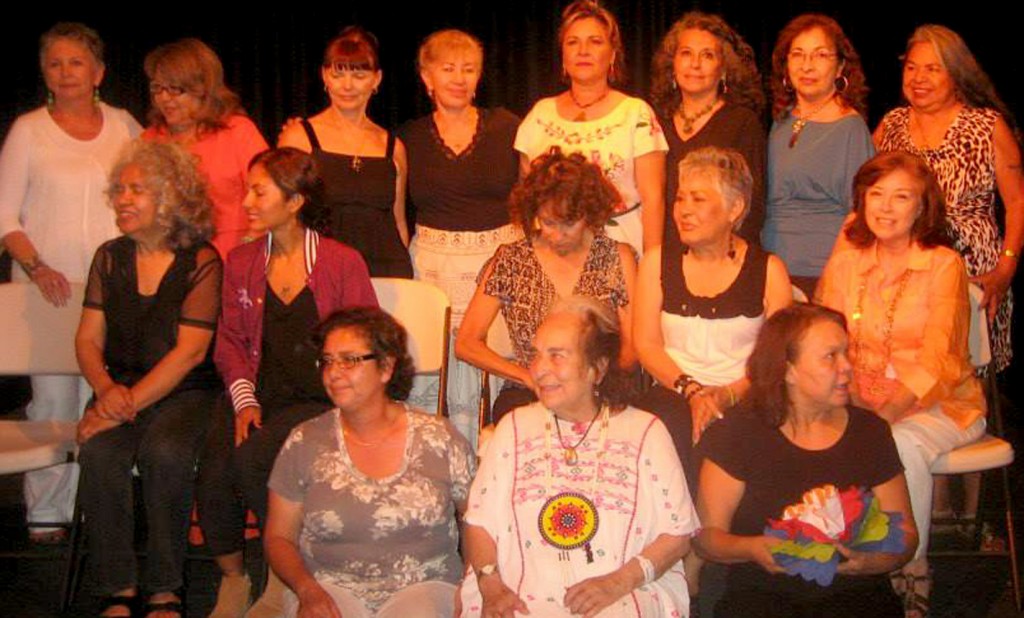Las Chicanas: “Their stories are important and need to be preserved”

A group of Chicanas came together last week to help preserve a part of American history that for a long time was ignored in academic circles.
Las Chicanas, a group of San Diego State University graduates who started gathering for reunions since 1970, held a fundraiser on Saturday, August 3rd, at the Centro Cultural de la Raza, to benefit the SDSU Chicana Archive to preserve their history and to raise consciousness about Chicana history.
“The women were actively a part of the U.S. Civil Rights Movement,” said Rita Sanchez, a retired Chicano and Chicana Studies professor who taught for more than 30 years at SDSU and San Diego Mesa College. “They spoke out for relevant education, rights for women, equality in the classroom and in student body elections; they spoke out for bilingual education at the same time they addressed sexism among their own ranks.”
At the Saturday event the program started with a blessing by Rosa Olga Navarro with Gracia Molina de Pick, an educator and activist who has been the beloved mentor for Las Chicanas. Molina de Pick was surrounded by sage smoke and honored for her many contributions of love and mentorship to Las Chicanas and others, Sanchez said.
The event and the program honored Chicanas who have passed away but who are still presente! and therefore, a living legacy in San Diego, including Laura Rodriguez, Herminia Enrique, Tina de Baca, Delia Moreno, Charlotte Hernandez-Terry, Lin Romero and Aida Mancillas.
The SDSU Chicana Archive will be part of San Diego State University Library’s Chicana & Chicano Archive Project, a collection that highlights the contributions of people of Mexican descent in the United States, with a special emphasis on Chicanas in San Diego’s history.
The Archive’s materials focus on the Chicano experience in southern California during the turbulent 1960s and 1970s and include numerous items focused on Latina feminists, according to Robert C. Ray, head of SDSU Special Collections & University Archives.
“Understanding the social and cultural landscape of the time is critical to appreciating that moment in our nation’s history, as well as the place of the Chicano movement within the civil rights struggle for social justice in the United States,” he said.
“The Archive demonstrates the value of primary sources and original materials in humanities education and pedagogy and provides an ideal foundation for exploring the human experience. The use of primary materials in education leads to critical and independent thinking and new interpretations of the historical record,” Ray said.
For Sanchez, Las Chicanas were part of a generation of women who, regardless of the racism and sexism prevalent in the early 1970s, stood up for their right to an education.
“They became leaders,” she said. “They became nurses, teachers, counselors, and principals. These women came from farm worker families and were the first in their families to go to college. They courageously faced racism and exclusion because of their culture. They were brave and smart to ban together to dialogue to challenge the unity and demand justice. This generation is a strong example for generations to come.”
The SDSU Chicana Archive mission statement describes its efforts as building a state-of-the-art Chicana Collection.
So far the Archive has acquired papers or artifacts from Enriqueta Chavez, Charlotte Hernandez Terry, Carmen Sandoval, Sonia Lopez, Maria Garcia, Rita Sanchez, and Olivia Puentes-Reynolds who has contributed the MANA Collection, Sanchez said.
One of Las Chicanas, Sonia Lopez, is heading the Chicana Oral History Project in San Diego, which will capture the stories and voices of many Chicanas in the county.
“Chicanas in San Diego who have contributed their lives for the betterment of others have a story to tell,” Sanchez said. “They are part of the U.S. Civil Rights movement for equality and justice. Their stories are important and need to be preserved. The SDSU Chicana & Chicano Archive Project is collecting their stories now. Each story adds something new.”
The SDSU Chicana & Chicano Archive Project is open to the public. You can learn more about it at library.sdsu.edu.





